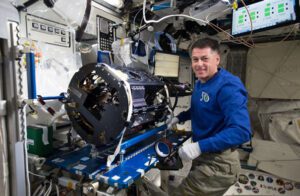A new type of flame produced on the International Space Station (ISS) doesn’t just look cool with its spherical blue glow—it is cool.
Cool flames, which burn at temperatures much lower than traditional hot flames, could be the key to improving internal combustion engine efficiency and reducing the emission of harmful pollutants.
 Currently, internal combustion engines in most cars burn gasoline at only 35% efficiency; however, incorporating cool flame chemistry into engines could theoretically increase the efficiency to as high as 60%. To gain a better understanding of cool flame chemistry, researchers are turning to the ISS National Laboratory.
Currently, internal combustion engines in most cars burn gasoline at only 35% efficiency; however, incorporating cool flame chemistry into engines could theoretically increase the efficiency to as high as 60%. To gain a better understanding of cool flame chemistry, researchers are turning to the ISS National Laboratory.
On Earth, cool flames are difficult to study because gravity-driven buoyancy quickly snuffs them out. This makes the space station’s microgravity environment an ideal platform to study these unique flames. A team of scientists, led by University of Maryland researcher Peter Sunderland, used microgravity conditions on the space station to produce cool diffusion flames from liquid fuel for the first time, providing new insight into cool flame chemistry.
The latest issue of Upward, official magazine of the ISS National Lab, delves into findings from this exciting research. Upward is dedicated to communicating the results of space station experiments that demonstrate the value of space-based research and development.
Read the article “Going Cool to Go Green” to see how studying cool flames in space could lead to cleaner, more efficient internal combustion engines on Earth.
The International Space Station (ISS) is a one-of-a-kind laboratory that enables research and technology development not possible on Earth. As a public service enterprise, the ISS National Lab allows researchers to leverage this multiuser facility to improve life on Earth, mature space-based business models, advance science literacy in the future workforce, and expand a sustainable and scalable market in low Earth orbit. Through this orbiting national laboratory, research resources on the space station are available to support non-NASA science, technology and education initiatives from U.S. government agencies, academic institutions, and the private sector. The Center for the Advancement of Science in Space (CASIS), Inc. manages the ISS National Lab, under Cooperative Agreement with NASA, facilitating access to its permanent microgravity research environment, a powerful vantage point in low Earth orbit, and the extreme and varied conditions of space.


